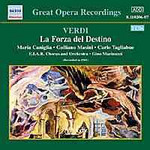
Verdi: La Forza del Destino (complete opera recorded in 1941)
 $40.00
Out of Stock
$40.00
Out of Stock6+ weeks add to cart
GIUSEPPE VERDI
Verdi: La Forza del Destino (complete opera recorded in 1941)
Maria Caniglia, Tancredi Pasero, Carlo Tagliabue / RAI Symphony Orchestra and Chorus, Turin, Gino Marinuzzi
[ Naxos Great Opera Recordings / 2 CD ]
Release Date: Saturday 20 August 2011
This item is currently out of stock. It may take 6 or more weeks to obtain from when you place your order as this is a specialist product.
"This is a fascinating, unmissable set both in historic and musical terms. Marinuzzi, a Toscanini coeval at La Scala, was chosen as conductor, and it's his only complete recording of an opera." (Gramophone Classical Music Guide)
"This is a fascinating, unmissable set both in historic and musical terms. Marinuzzi, a Toscanini coeval at La Scala, was chosen as conductor, and it's his only complete recording of an opera. The recording took place in May 1941 and was issued on 78rpm discs by Cetra. After the war Parlophone, which was then in charge of Cetra recordings in Britain, issued - in desultory fashion - a few separate discs. Sadly the whole version has never had the currency its great merits deserve, not at least as the first complete set (bar one traditionally cut scene) of the work and one with an entirely Italian cast. Now we have it to enjoy at superbudget price and in admirable transfers from original Cetra pressings, by Ward Marston.
For the recording Marinuzzi had assembled a vintage cast of Italian singers of the day. Caniglia herself rightly considered her Leonora here as one of her finest recordings: one can hear why in her committed, vibrant and often very sensitive singing: she even attempts some of the refined pianissimos that graced the reading of this role by her near-contemporary, Zinka Milanov. It's a performance imbued with spiritual yearning - exactly what's wanted. By her side Masini's Alvaro is obviously a man of action with his blade-like, spinto tenor and sense of desperation at Alvaro's plight.
If he's occasionally too lachrymose that's only a sign of his empathy with his role. As Alvaro's implacable antagonist, Don Carlo, Tagliabue provides dependable tone and an authentically styled interpretation of a kind seldom heard today.
The pair's final and fatal encounter is one of the score's and the set's highlights.
Stignani, in her absolute prime, is a formidable Preziosilla, full in tone and clear in her passagework, exemplary in every way. Marston has made the recording as amenable as is possible. In any case it would be worth suffering much worse sound than this for such a satisfying traversal on all sides of this inspired score."
(Gramophone Classical Music Guide)